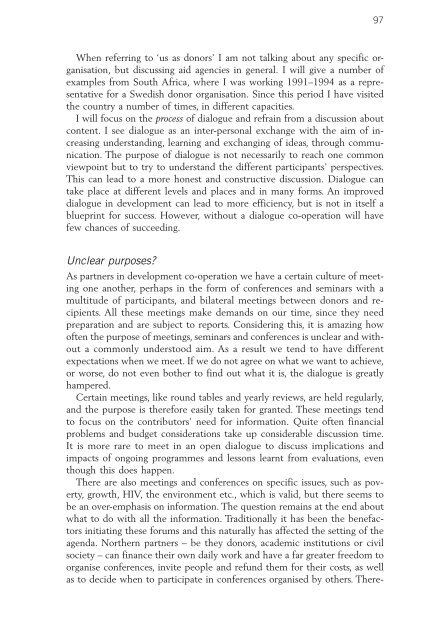Dialogue in Pursuit of Development - Are you looking for one of ...
Dialogue in Pursuit of Development - Are you looking for one of ...
Dialogue in Pursuit of Development - Are you looking for one of ...
You also want an ePaper? Increase the reach of your titles
YUMPU automatically turns print PDFs into web optimized ePapers that Google loves.
When referr<strong>in</strong>g to ‘us as donors’ I am not talk<strong>in</strong>g about any specific organisation,<br />
but discuss<strong>in</strong>g aid agencies <strong>in</strong> general. I will give a number <strong>of</strong><br />
examples from South Africa, where I was work<strong>in</strong>g 1991–1994 as a representative<br />
<strong>for</strong> a Swedish donor organisation. S<strong>in</strong>ce this period I have visited<br />
the country a number <strong>of</strong> times, <strong>in</strong> different capacities.<br />
I will focus on the process <strong>of</strong> dialogue and refra<strong>in</strong> from a discussion about<br />
content. I see dialogue as an <strong>in</strong>ter-personal exchange with the aim <strong>of</strong> <strong>in</strong>creas<strong>in</strong>g<br />
understand<strong>in</strong>g, learn<strong>in</strong>g and exchang<strong>in</strong>g <strong>of</strong> ideas, through communication.<br />
The purpose <strong>of</strong> dialogue is not necessarily to reach <strong>one</strong> common<br />
viewpo<strong>in</strong>t but to try to understand the different participants’ perspectives.<br />
This can lead to a more h<strong>one</strong>st and constructive discussion. <strong>Dialogue</strong> can<br />
take place at different levels and places and <strong>in</strong> many <strong>for</strong>ms. An improved<br />
dialogue <strong>in</strong> development can lead to more efficiency, but is not <strong>in</strong> itself a<br />
bluepr<strong>in</strong>t <strong>for</strong> success. However, without a dialogue co-operation will have<br />
few chances <strong>of</strong> succeed<strong>in</strong>g.<br />
Unclear purposes?<br />
As partners <strong>in</strong> development co-operation we have a certa<strong>in</strong> culture <strong>of</strong> meet<strong>in</strong>g<br />
<strong>one</strong> another, perhaps <strong>in</strong> the <strong>for</strong>m <strong>of</strong> conferences and sem<strong>in</strong>ars with a<br />
multitude <strong>of</strong> participants, and bilateral meet<strong>in</strong>gs between donors and recipients.<br />
All these meet<strong>in</strong>gs make demands on our time, s<strong>in</strong>ce they need<br />
preparation and are subject to reports. Consider<strong>in</strong>g this, it is amaz<strong>in</strong>g how<br />
<strong>of</strong>ten the purpose <strong>of</strong> meet<strong>in</strong>gs, sem<strong>in</strong>ars and conferences is unclear and without<br />
a commonly understood aim. As a result we tend to have different<br />
expectations when we meet. If we do not agree on what we want to achieve,<br />
or worse, do not even bother to f<strong>in</strong>d out what it is, the dialogue is greatly<br />
hampered.<br />
Certa<strong>in</strong> meet<strong>in</strong>gs, like round tables and yearly reviews, are held regularly,<br />
and the purpose is there<strong>for</strong>e easily taken <strong>for</strong> granted. These meet<strong>in</strong>gs tend<br />
to focus on the contributors’ need <strong>for</strong> <strong>in</strong><strong>for</strong>mation. Quite <strong>of</strong>ten f<strong>in</strong>ancial<br />
problems and budget considerations take up considerable discussion time.<br />
It is more rare to meet <strong>in</strong> an open dialogue to discuss implications and<br />
impacts <strong>of</strong> ongo<strong>in</strong>g programmes and lessons learnt from evaluations, even<br />
though this does happen.<br />
There are also meet<strong>in</strong>gs and conferences on specific issues, such as poverty,<br />
growth, HIV, the environment etc., which is valid, but there seems to<br />
be an over-emphasis on <strong>in</strong><strong>for</strong>mation. The question rema<strong>in</strong>s at the end about<br />
what to do with all the <strong>in</strong><strong>for</strong>mation. Traditionally it has been the benefactors<br />
<strong>in</strong>itiat<strong>in</strong>g these <strong>for</strong>ums and this naturally has affected the sett<strong>in</strong>g <strong>of</strong> the<br />
agenda. Northern partners – be they donors, academic <strong>in</strong>stitutions or civil<br />
society – can f<strong>in</strong>ance their own daily work and have a far greater freedom to<br />
organise conferences, <strong>in</strong>vite people and refund them <strong>for</strong> their costs, as well<br />
as to decide when to participate <strong>in</strong> conferences organised by others. There-<br />
97

















![CynefinFramework final [Read-Only]](https://img.yumpu.com/19017304/1/190x135/cynefinframework-final-read-only.jpg?quality=85)